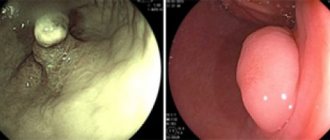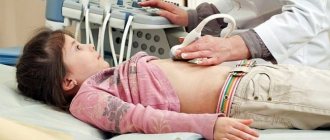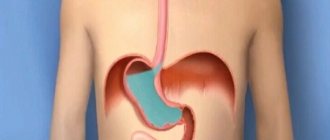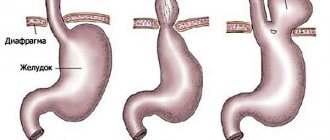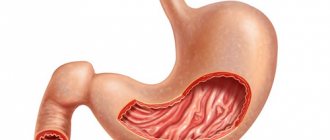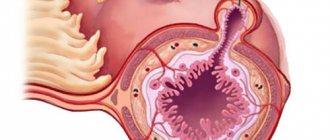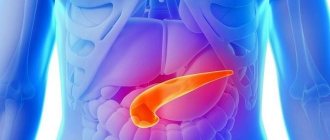A large number of people wonder if the cardia does not close completely - what is it and why does it happen. This disease, called insufficiency (chalasia) of the gastric cardia, causes disturbances in the motor function of the digestive tract. Often in the early stages of development, the patient does not take the symptoms of this disease seriously and resorts to self-medication. This behavior can lead to a chronic form of the disease and the emergence of dangerous pathological processes. This article will talk about the causes and symptoms of this disease.
Functions of the cardia
The sphincter of the cardia separates the esophagus and stomach and prevents the return of stomach contents and juices involved in the digestive process back into the esophagus. In situations where the cardia of the stomach does not close completely, gastric contents can cause damage to the mucous membrane of this part of the digestive canal.
Inflammation in the esophagus over a long period of time contributes to the development of certain diseases. Lack of timely treatment can lead to the development of esophageal cancer.
Symptoms and stages of the disease
When the cardia does not close completely, what is it and what are the symptoms of this disease? This question interests many people who are faced with this problem.
Typically, with the development of cardiac valve insufficiency, patients are concerned about the following symptoms:
- A burning sensation in the esophagus, which is localized behind the sternum and under the urinary process.
- The presence of nausea, in some cases vomiting.
- Backflow of air from the stomach or esophagus, belching of sour contents.
If the vagus nerve is irritated, when the cardia in the esophagus does not close completely, feelings of weakness and headache may appear.
There are three stages of this disease:
- The sphincter muscles of the cardia retain their mobility. There is a slight gaping of the hole; the characteristic symptoms include only belching of air without any aftertaste.
- The sphincter almost loses its mobility, the valve closes the opening only halfway.
- The sphincter is completely motionless, the opening resembles a gaping hole. There are signs of inflammation, erosion, and ulcers.
Symptoms of cardiac sphincter failure
It’s not difficult to guess that it’s time to pay a visit to the hospital. As a rule, all patients complain of the same symptoms. It is due to:
- Frequent belching, especially when lying down or before bed.
- Heartburn, aching burning pain behind the sternum.
- Feeling that the stomach is full, the urge to vomit.
- Seething in the stomach, permanent nausea.
- General weakness, lethargy, lack of appetite.
- Decreased physical performance, rapid fatigue.
The cardia does not close completely: what is it (reasons)
The development of chalasia cardia can be triggered by certain factors and diseases.
- The main cause of all pathologies of the digestive system is an unbalanced diet: overeating, drinking soda, sour fruits, alcohol-based drinks, strong tea or coffee in unlimited quantities. There is an opinion that citrus fruits, tomatoes and chocolate most contribute to the fact that the cardia does not close completely. The esophagus and its mucous membrane experience additional stress, and disturbances in the functioning of the digestive system are observed.
- Sedentary lifestyle. With a lack of physical activity, the muscles of the thoracic spine may undergo atrophy over time. The partial displacement of organs that occurs under the influence of this process serves as an impetus that provokes the development of cardia failure.
- Overweight people are also often interested in whether the cardia does not close completely - what does this mean.
- Cardiac valve insufficiency sometimes develops against the background of certain stomach diseases.
- Increased intra-abdominal pressure caused by pregnancy, heavy physical activity, and wearing tight clothing is also a symptom of this disease.
Severity of defeat
There are three degrees of severity that characterize the failure of the cardiac sphincter.
I degree insufficiency
It manifests itself as airy belches several times a day; as a rule, nothing bothers patients yet, there is no pain. The sphincter has a space open to no more than one third of its total diameter. The cardiac sphincter is mobile, but cannot close completely.
II degree insufficiency
Patients also complain of belching, but in the second degree of insufficiency it is already painful, frequent and does not stop for a long time. The sphincter closes only halfway, and partial penetration of part of the gastric mucosa into the esophageal cavity may occur.
III degree insufficiency
The most severe stage of the disease is when the sphincter does not close at all - there is a complete gaping. Patients in this case complain of incessant nausea, vomiting, general deterioration in health, dizziness, and chest pain. Patients lose weight because food components are very poorly absorbed.
There is another medical classification, which also distinguishes three stages of the disease and the nature of the disorders:
- Hypermotile (excessive) peristalsis, which is not associated with the load on the pulp;
- Hypomotile (reduced) peristalsis;
- Amotile - the esophageal sphincter practically does not contract, that is, there is no peristalsis.
To determine the extent of damage to the esophageal sphincter, doctors prescribe an endoscopic procedure called fibrogastroscopy or FGS. To undergo the examination, the patient must swallow an endoscope, which will show the problem from the inside, in the truest sense of the word. Many are afraid to undergo this procedure, fearing unpleasant sensations, and put off visiting the doctor until the last minute. In fact, there is nothing scary about FGS; the endoscope does not interfere with breathing and is almost not felt if you set up correctly and prepare for the manipulations.
The fastest and easiest way to recognize the insufficiency of the cardiac sphincter is the FGS procedure.
How is the FGS procedure performed?
Typically, the study is scheduled for the morning; the patient must arrive at the hospital on an empty stomach, having had a light dinner the night before. On the eve of your visit to the doctor, you need to stop smoking and also avoid chewing gum, which can cause mucus to appear in the esophagus. Those patients who are too worried before the procedure are allowed to take light sedatives (valerian or analogues) in advance.
During the FGS procedure, the patient is placed on his side, and the person holds a small plastic ring in his teeth (so as not to unexpectedly damage the device). After that, a thin fiber-optic wire is inserted through the mouth into the stomach cavity, at the end of which there is lighting and a micro-camera. With its help, the endoscopist sees everything that is happening inside, in particular, the degree of insufficiency of the cardiac sphincter and damage to the esophageal mucosa, if any.
Possible complications after FGS
Treatment options
In cases where the cardia does not close completely (a gastroenterologist can clearly explain what this is), treatment should be carried out immediately. Its choice depends on the severity and intensity of symptoms and the presence of complications.
The main goals of this therapy course are:
- Elimination of the disease that provokes a pathological process in the esophageal sphincter.
- Decreased intra-abdominal pressure.
- The fight against symptoms, the manifestation of which forces patients to look for an answer to the question of whether the cardia does not close completely, how to treat this disease.
- Establishing the normal functioning of the esophageal sphincter.
To solve these problems, the doctor may prescribe certain medications, a special diet, or resort to behavioral therapy. People suffering from obesity will need to get rid of extra pounds.
Therapeutic diet
The diet for the treatment of cardia insufficiency is based on fractional meals. In order to reduce pressure inside the stomach, it is recommended to eat small portions of food. Experts advise eating at least 4 times a day.
To avoid irritation of the esophageal mucosa, it is recommended to exclude certain foods from the diet.
- Alcohol based drinks.
- Marinades, pickles, smoked meat.
- Semi-finished products and sausages.
- Carbonated drinks.
- Strong coffee and tea.
If you follow a diet that helps ensure that the cardia closes completely and the esophagus is freely passable, it is recommended not to eat food that is very hot or cold.
Treatment of gastric cardia incompetence
Of course, receiving treatment via the Internet is inadmissible in any case, and the doctor will prescribe therapy on an individual basis. However, there are a number of recommendations that people diagnosed with cardiac sphincter insufficiency must follow.
First of all, this is the establishment of a daily routine and a special diet. It is strictly forbidden to eat too much, eat too salty, pickled, spicy and fatty foods. A complete ban is imposed on alcohol, citrus fruits, and chocolate. Patients should eat four to five small meals a day that provide a slight feeling of fullness. After a person has eaten, a horizontal position should be avoided for one and a half to two hours - you can walk or, at most, sit down. No later than three to four hours before going to bed, you need to exclude all kinds of food.
In the treatment of cardiac sphincter insufficiency, not only pills help, but also a properly organized nutritional regimen
In general, the diet is based on boiled or steamed dishes with a small amount of salt. To reduce gastric acidity, “enveloping” foods such as jelly and porridge are included in the diet. It is worth making sure that food is chewed slowly and thoroughly; eating pureed foods and first courses is encouraged. Avoid eating too cold or hot dishes - food should be warm.
An important point is that during treatment you need to say goodbye to such a bad habit as smoking. In addition to the main harm from cigarettes, they also provoke the powerful production of digestive enzymes. Simply put, when a person smokes a cigarette, the gastrointestinal tract believes that he has eaten and begins the digestive process, but in fact, the stomach digests itself.
During the treatment process, doctors also prohibit all physical work, and especially overload. This also applies to the emotional state of patients - they are strongly advised not to be nervous. Sometimes a gastroenterologist works in tandem with a physical therapist and the patient is prescribed gentle exercises. They are designed to restore the tone and muscles of the cardiac sphincter, and at the same time strengthen the diaphragm, abdominal and abdominal muscles, lumbar spine and other muscles. Often, breathing exercises and elements of yoga are used to support the body during treatment. But you should understand that even harmless exercises are strictly prohibited without a doctor’s recommendation.
Breathing exercises
There are also a number of specific restrictions:
- Avoiding tight clothing, belts, elastic bands, etc.
- The lying position should be taken so that the head is slightly elevated.
- Frequent tilting of the head and body must be controlled and avoided.
- Work and interaction with chemicals must be stopped, and it is recommended not to return to it even after treatment.
Of course, mandatory treatment also includes taking medications.
Doctors usually prescribe a set of drugs:
- Antacids that relieve a burning sensation in the throat and heartburn.
- To restore and maintain the esophageal mucosa.
- Preventing stagnation in the stomach cavity, improving its motility.
- Antiemetic drugs.
- Specialized painkillers (pain can be caused by severe damage to the mucous membrane, right down to the muscle layer, so regular painkillers simply won’t cope).
- Antibiotics and antiprotozoal agents.
In cases where therapeutic treatment does not bring a positive effect, the patient is transferred from the gastroenterology department to surgery. Yes, insufficiency of the cardiac sphincter can be solved surgically: fundoplication, pyloroplasty, selective vagotomy. Of course, such serious issues are discussed with the attending physician, but we cite them as an example of the possible seriousness of the disease, which cannot simply be ignored.
Video - What is gastric cardia insufficiency
Drug therapy
In cases where the cardia rosette does not close completely, treatment is prescribed by a doctor according to the course of the diagnosed disease. Very often, the cause of cardia insufficiency is gastritis. In such cases, specialists prescribe medications that reduce the aggressiveness of the stomach contents:
- Medicines that slow gastric secretion.
- Drugs that neutralize high acidity.
- Film-forming drugs.
- Agents that stimulate mucus production.
At the initial stage of development of cardia failure, the course of treatment can be aimed at relieving and mitigating the symptoms of the disease.
Currently, medications that can stimulate gastrointestinal motility are gaining popularity. They are called prokinetics.
In cases of infection, antibiotics are also included in the course of treatment for this disease.
Identifying concomitant diseases and studying a detailed history allows specialists to select an individual course of treatment for each patient. There are cases (lack of effective treatment results, hiatal hernia) when surgical intervention cannot be avoided.
Lifestyle
To ensure that the esophagus is freely passable and the cardia closes completely, certain rules must be followed:
- It is not recommended to overuse physical activity and bend over sharply, especially after eating.
- You should not wear tight clothes that fit your body, tight belts or waistbands.
- You should not go to bed immediately after dinner; it will be useful to move around a little.
- It is recommended to sleep with the head of the bed elevated.
- It is recommended to eat at least three hours before bedtime.
Principles of treatment of cardiac failure
The goal of therapy is to eliminate odious symptoms and restore valve functionality.
The objectives of treatment are reduced to fulfilling the following conditions:
- lose weight;
- stabilize intra-abdominal pressure;
- change eating behavior;
- use medications to relieve symptoms.
Diet food
Diet correction is the basis of therapy for sphincter dysfunction. In order not to provoke an exacerbation, you should not consume a number of foods and drinks. The cardiac sphincter will not close properly when exposed to stimuli.
The following must be excluded from the menu:
- fat meat;
- fast food;
- mayonnaise-based sauces;
- hot spices and seasonings;
- pickled and salted foods;
- sauerkraut, lemons and other foods high in acid;
- smoked fish and meat;
- chocolate desserts;
- coffee;
- low fat kefir;
- any alcoholic drinks.
In addition to the diet, you must follow the following rules:
- You should completely avoid processing foods using the culinary method of frying. Dishes must be steamed, boiled or stewed.
- Eating is carried out according to the principle: little, but often. You need to eat every 3-4 hours. A single serving should not exceed 350-400 grams.
- A prerequisite is the vertical position of the body for one and a half hours after eating. Otherwise, the reflux of unprocessed food and acid into the esophagus is inevitable.
- The final meal is taken 3 (minimum 2.5) hours before bedtime.
- Maintain food at the correct temperature. Do not consume very hot foods or drinks.
In addition, you should try to limit physical activity and sports exercises associated with bending the body.
Medical component of treatment
Drug therapy includes several groups of drugs.
- The main treatment is to restore the motor activity of the digestive tube and valve. This category of drugs includes parkinetics: Reglan, Metamol, Domperidone, Metaclopramide, Cerucal, Perinorm.
- In the presence of severe pain, analgesics are used: Ibuprofen, Baralgin.
- Omeprazole (Omez) is recommended to inhibit (block) hydrochloric acid.
- Symptomatic treatment of heartburn is carried out by: Gastal, Gastrocid, Rennie, Gaviscon.
- Based on the diagnostic results, the presence of Helicobacter pylori and the degree of its activity are determined. To eliminate bacteria, De-Nol and Phosphalugel are used. Antibiotic treatment is prescribed if necessary.
The doctor determines the regimen and duration of drug intake individually.
Surgical correction of the cardiac sphincter defect is rarely performed.
Treatment with folk remedies
In the treatment of chalazia cardia, traditional medicine is often used. You can resort to them only after consulting a specialist.
This disease can be overcome in the following ways:
- Before meals, it is advised to drink half a glass of decoction from the root of the marsh calamus.
- Dandelion flowers should be ground with sugar. The resulting syrup should be dissolved in half a glass of water and taken orally.
- A decoction of caraway seeds is considered an effective remedy for the treatment of cardia insufficiency.
- Before meals, it is recommended to drink plantain juice obtained from fresh leaves of the plant.
- Licorice root syrup has enveloping properties
Currently, diseases of the gastrointestinal tract are very common. Initial, non-concerning symptoms from different parts of the digestive system should prompt an immediate visit to a specialist. This step will allow you to identify the pathology in its initial stage, begin a course of treatment on time, and avoid unpleasant consequences.
ethnoscience
It would be useful to supplement the main treatment with herbal decoctions according to traditional medicine recipes.
To relieve symptoms, herbal decoctions are prepared based on:
- oregano;
- oak bark;
- quince seeds;
- motherwort.
After completing the course of treatment, a patient with chalazia should not give up dietary nutrition. In case of so-called breakdowns, there is a high probability of symptoms returning, and therapy will have to be resumed.
Untimely treatment of cardiac sphincter failure leads to serious complications, such as gastric ulcer and the formation of Barrett's esophagus (a precancerous condition of the digestive system).
